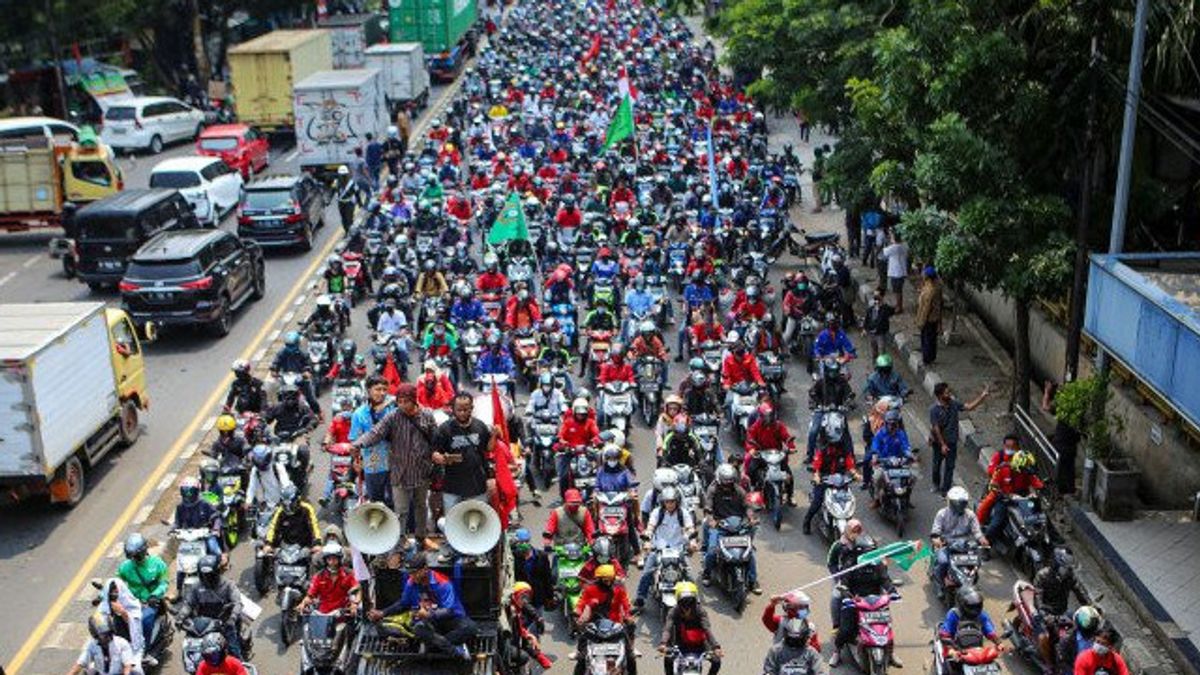JAKARTA - The Confederation of Indonesian Trade Unions (KSPI) rejects the determination of the provincial minimum wage or UMP 2022 which refers to the mandate of Government Regulation (PP) Number 36/2021 concerning Wages which is a derivative of Law Number 11/2020 concerning Job Creation. However, KSPI requested that the amount refer to Law No. 13/2003.
Previously, the Indonesian Employers' Association (Apindo) questioned the basic rules used by the Confederation of Indonesian Trade Unions (KSPI) for requests for an increase in the 2022 district/city minimum wage (UMK) at around 7 percent to 10 percent.
KSPI President Said Iqbal said that his party still adhered to the wage formula contained in Law (UU) No. 13/2003 concerning Manpower. The reason is because the Omnibus Law on Job Creation or Law 11/2020 is being challenged in the constitutional court (MK).
Furthermore, Iqbal said that the trial for the Copyright Law lawsuit was ongoing, both formal and material trials. Thus, any laws or regulations that are being sued are not inkrah and may not be used. Thus, the law cannot be used as a reference. Including, PP No. 36/2021 as a derivative.
"Apindo argues that PP No. 36 derived from Omnibus Law is used as the basis. Our question is, does Apindo understand the constitution? Or because the government protects, Apindo is arrogant, the Minister of Manpower and Apindo are arrogant. PP No. 36 regarding wages is derived from the Omnibus Law or the Law Job Creation," he explained in a virtual press conference, Wednesday, November 3.
According to Iqbal, because the Job Creation Act has not yet been signed and cannot be used as a reference for determining the 2022 UMK, KSPI uses Law Number 13/2003 and Government Regulation Number 78/2015 to fill the legal void.
"That the increase in the minimum wage uses inflation plus year on year economic growth from September of the previous year to September of the current year and takes into account KHL (Decent Living Needs). And there is UMSK, because the omnibus law has not been sued yet," he explained.
Previously, the Chairperson of Apindo, Hariyadi Sukamdani, questioned the basic rules used by the Confederation of Indonesian Trade Unions (KSPI) for requests for an increase in the 2022 district/city minimum wage (UMK) at around 7 percent to 10 percent.
"Regarding the amount of 7 percent or how much, it refers to the rules, what is the basis. Frankly, we don't know what the basis is," said Hariyadi, in a virtual press conference, Tuesday, November 2.
According to Hariyadi, the determination of the 2022 UMK should refer to Law (UU) Number 11 of 2020 concerning Job Creation and Government Regulation (PP) Number 36 of 2021 concerning Wages.
Hariyadi explained that when viewed from the provisions governing the amount of wages prior to the existence of these two regulations, there were provisions regarding Decent Living Needs (KHL) which were regulated in the Minister of Manpower Regulation Number 18 of 2020 concerning Amendments to the Regulation of the Minister of Manpower Number 21 of 2016 concerning Decent Living Needs.
However, Hariyadi continued, because there is already a Job Creation Law and PP Number 36 of 2021, of course the Permenaker Number 18 of 2020 is no longer used. According to Hariyadi, if you refer to the regulation, the result will be no increase in wages.
"We tested, there are 64 components, for Jakarta alone, the result is that the KHL is below the minimum wage. It doesn't increase. We include the others, the inflation is low, the economy is also dropping," he said.
The English, Chinese, Japanese, Arabic, and French versions are automatically generated by the AI. So there may still be inaccuracies in translating, please always see Indonesian as our main language. (system supported by DigitalSiber.id)








